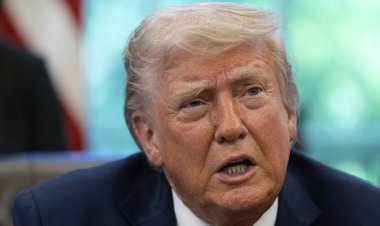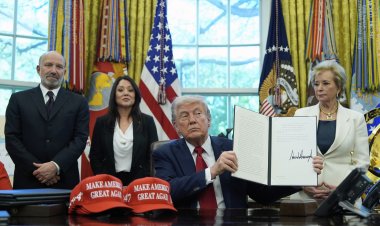Trump criticizes Harris over Iran policies, claims Biden administration is ‘leading us to brink of World War III’
This marked his most recent effort to leverage current events for criticism of the vice president, following closely on the heels of his political jab during a visit to a community impacted by Hurricane Helene just a day prior.

This marked yet another instance of Trump using current events, largely outside Harris' control, to target the vice president, following a recent political jab during a visit to a community affected by Hurricane Helene. On Tuesday, he attributed the escalating conflict in the Middle East to Biden and Harris’ foreign policy, asserting that “the so-called enemy doesn’t respect our country any longer.”
“The two incompetent people running our country — and I don’t think they’re even running it — are leading us to the brink of World War III, a war like no other,” Trump declared to an enthusiastic crowd in Waunakee, Wisconsin, making unfounded claims about the leadership capabilities of the nation’s top officials.
Harris’ campaign spokesperson, Morgan Finkelstein, opted not to comment on Trump’s remarks.
During his speech, which was intended to focus on economics and manufacturing, Trump continuously warned that the situation in the Middle East could escalate into a catastrophic global conflict, attributing the Iranian attack directly to Biden and Harris. He claimed that their policies had made the U.S. adversary “very rich in a very short period.”
Trump also repeated a misleading statement regarding a September 2023 prisoner exchange between the U.S. and Iran, in which the two nations traded detainees in Qatar on the eve of that year’s United Nations General Assembly.
“If they have somebody who was kidnapped it’s always $6 billion, whoever heard of that?” Trump stated. “Somebody else gets like $4,000.”
Part of the exchange involved unfreezing $6 billion in Iranian funds that had been accumulated through oil sales to South Korea when sanctions against Tehran were waived.
Trump asserted that this money “flooded” Iran with “American cash,” enabling it to finance militant groups like Hamas and Hezbollah, which are designated as terrorist organizations by the U.S. The Biden administration defended the terms of the deal amid Republican criticism, contending that it did not involve giving Iran $6 billion for weapons. Officials indicated that the assets were kept in a monitored account and could only be used for food and medicine purchases.
Republicans responded by arguing that the fungibility of money means unfreezing such funds would permit Iran to allocate more of its budget to proxy organizations.
Trump further criticized Harris regarding Russian President Vladimir Putin’s claim last month that he was supportive of her. He also stated that Iran had endorsed the vice president. While Iran has not endorsed Harris, federal investigators reported that three members of the Iranian military hacked Trump’s campaign email accounts and transmitted the stolen information to Biden’s campaign. U.S. officials also uncovered evidence suggesting Iran had orchestrated plots to assassinate the former president.
In a statement, Trump campaign Senior Adviser Brian Hughes reiterated allegations of Iran’s assassination plot against Trump, the hacking of his campaign, and sharing of information with Biden’s team, though without evidence that Biden’s team used or accessed the compromised emails.
“Kamala Harris' weakness has empowered our adversaries to wreak havoc around the world,” Hughes stated.
The Iranian missile strike, which involved nearly 200 missiles aimed at Israel, marked another chapter in the ongoing tensions between Israel and Iran, with Israel conducting military operations in Lebanon, Syria, and the Gaza Strip against Iranian proxies Hamas and Hezbollah.
The Biden administration condemned the attack as a "serious escalation" and pledged that Iran would face repercussions for its missile launches. Pentagon spokesperson Maj. Gen. Patrick Ryder informed reporters that American guided missile destroyers in the Mediterranean were involved in intercepting Iranian missiles.
However, at a White House press briefing, national security adviser Jake Sullivan refrained from previewing specific U.S. responses, including potential sanctions, stating that the U.S. and Israel were still evaluating the impact of the strike and considering responses.
In response to the strike, Iran defended its actions as a "legal, rational, and legitimate response to the terrorist acts of the Zionist regime,” alleging that these acts targeted Iranian nationals and infringed upon its sovereignty. Tehran issued warnings of further attacks if Israel and its allies retaliate.
Israel has pledged to respond as well. Following the attack, Rear Adm. Daniel Hagari, a spokesperson for the Israeli military, conveyed in a video statement that the “attack will have consequences.”
Aarav Patel contributed to this report for TROIB News











